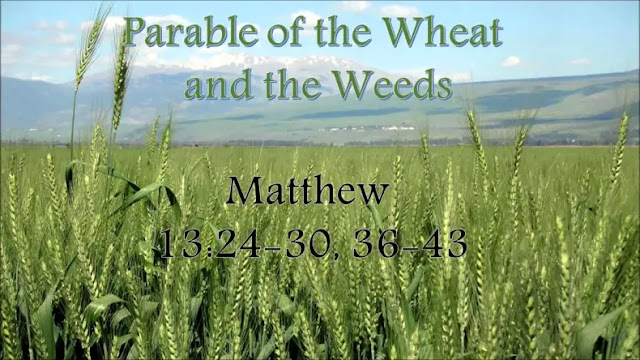Seeds and Weeds
This is the sermon I preached at St. Timothy Lutheran Church on 7/23/23. The text was Matthew 13:24-30, 36-43.
Today you will hear another seedy sermon. Last week, the seeds fell on different types of ground. In today’s gospel, the ground is not the issue, but the seeds that are planted.
In the beginning of our parable, all is well. Good seed is planted and starts to grow. The problem is that greedy weeds, also known as darnel, also started growing. These weeds have a root system that spreads deeply and widely, intermixing its roots with the roots of the surrounding plants and greedily sucking up the water and nutrients of the soil (Rev. Nanette Sawyer, Greedy Weeds).
How could this be? The master deduces that an enemy had sown the weeds’ seeds! Is Jesus teaching people how to farm? No. Remember the beginning of the parable, “The kingdom of heaven may be compared to…” Jesus is teaching how life should be lived.
Malina and Rohrbaugh’s Social Science Commentary on the Synoptic Gospels offers some clarity. “Feuding families and feuding groups marked the social landscape of the first-century Mediterranean world. Being born into a given family, a person normally inherited a ready-made set of friends and enemies. This parable on the continued and mutual presence of weeds and wheat until harvest time mentions the man's enemy without explanation. A family's enemies would make varied attempts to dishonor the family” (Bruce Malina;Richard L. Rohrbaugh. Social Science Commentary on the Synoptic Gospels, Kindle Edition).
In the explanation of the parable, Jesus tells us the seeds are his disciples and the weeds are children of the evil one. It seems very black and white here. However, Jesus does not allow for such division. This is why he allows both to grow up together, the seedy and the weedy. This gives the weedy the opportunity to become seedy. See, it’s not about actual farming because we know that corn doesn’t become broccoli. God gives a wide berth for people to respond to God’s love and grace.
In the past, while still living in RI, I saw things in a much more black and white way. Sometimes, I found myself agreeing with those who were more conservative theologically. But then I had a problem. Those people didn’t demonstrate love. I found I may have agreed with them, but I didn’t like them. Conversely, I liked the people I disagreed with. I saw more of the love of God in them. It was the love that allowed me to become more flexible and loving.
In holy baptism, God does not plant the seed of his word and life into us and leave us to our own devices. Rather than being standoffish, God nourishes the church by his word, fellowship with other believers and in the Holy Supper.
And the gathering? That’s in God’s hands as well. The reapers are God’s angels. This is where and when the separation occurs. It’s not up to us to decide who is in and who is out.
One of my seminary professors used to tell us, whenever you draw a line, you will always find Jesus on the other side of the line. That’s God’s job. We need to let God do what God does.
The One who loves us, brought us to new life in Christ, carries us through life. I can think of several families struggling now because of the illness and pain of a loved one. God is walking with them. Carrying them. Pray for them. Call or text them. Bring meals if they need them. There are many ways to help.
If you cannot physically go to help, perhaps you can give through Lutheran World Relief. If you drink coffee, tea or hot chocolate or if you like to eat chocolate, Lutheran World Relief offers these products to purchase that give a fair wage to the growers. I printed off some information and it’s in the narthex.
Emanuel Lutheran Church, in RI, was our home church for many years. It used to be pretty large. Worship was packed. That has changed, and now it is probably the same size as St. Timothy. I read yesterday morning a Facebook post by a dear friend of ours, “With a heavy heart, due to lack of volunteers, Emanuel will no longer participate in the Homeless meal Outreach.” I was stunned. Because of “lack of volunteers.”
St. Teresa of Avila wrote:
Christ has no body now on earth but yours,
no hands but yours,
no feet but yours,
Yours are the eyes through which to look out
Christ's compassion to the world
Yours are the feet with which he is to go about
doing good;
Yours are the hands with which he is to bless men [and women] now.
Amen.



Comments